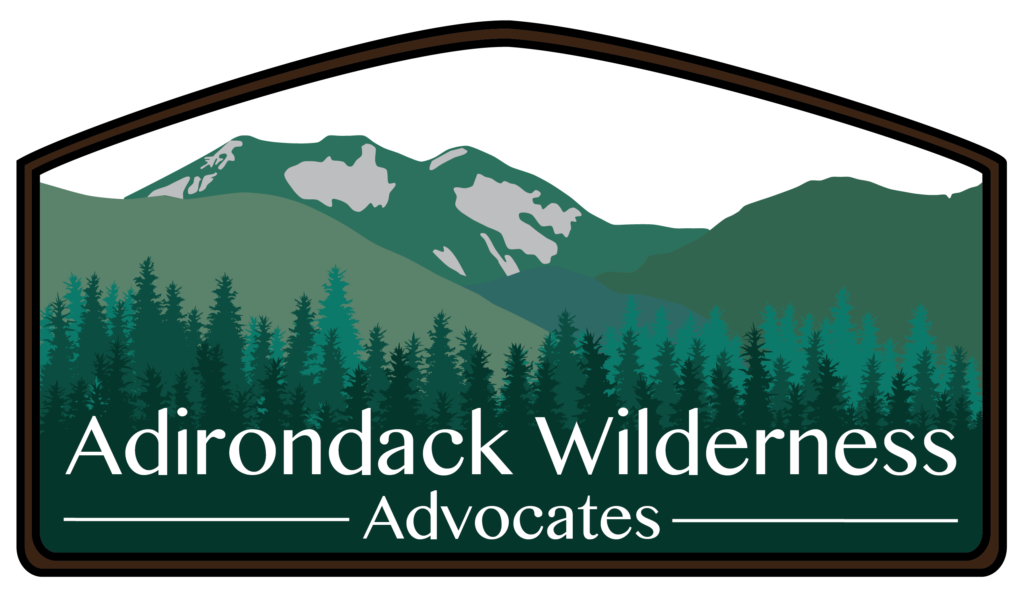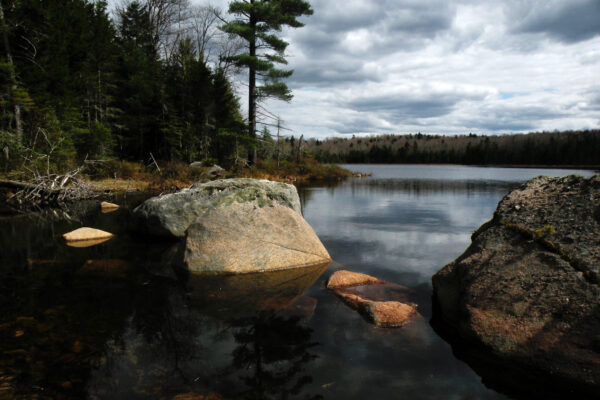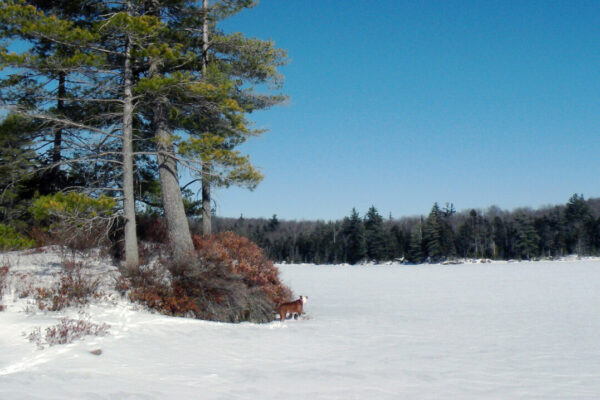Purdy was beginning to struggle in the March snow. We had been striding easily across it for most of the morning, and until the last hour or so it had been a hard and compact surface that held our weight without complaint. But now that the afternoon sun had emerged from the clouds, the snow was softening and we were starting to sink in with each step.
We had only made it partway up Sunshine Pond’s northern panhandle, a narrow stretch of graying ice with a shoreline indented by boggy coves. Getting here had not been a problem for either of us, but now even with her slender frame my pup was having to work extra hard to keep up with me and my snowshoes. Her thin legs were sinking deeper into my tracks, and her steps forward had become a laborious trudging effort. Because she was following behind me I had not noticed right away, but when I realized she was struggling I stopped us here in the woods beside the pond on this sunny afternoon, wondering what to do next.
“Hey, Purd, it’s not looking good, is it?” Her wide dark eyes were studying me intently for an indication of what I now expected her to do. I knew she’d follow wherever I decided to go no matter what the conditions, so it was up to me know her limitations.
Part of my interest in coming out to the Pepperbox was not just to see Sunshine Pond, where we planned to spend the night, but to bushwhack out to as many of the other nearby ponds as we had time for. Twin Ponds was the most feasible of all our options, since it didn’t require crossing any ice. The panhandle pointed right to it, and little more than a quarter mile separated it from this pond. Therefore it was not a question of distance or difficult terrain that was stopping us, just a matter of the late-season snow changing from hardpan to molasses at the first hint of mild weather.
The sunlight was creating an intricate network of forest shadows smudged like ashy streaks across the foot or so of remaining snow. The snow was very old and very gritty, speckled by a winter’s worth of sticks, twigs, and flecks of bark. Just a few weeks ago, if the sun was seen at all, the shadows it cast through the trees were bluish and soft. This March harshness was a clear signal of the about-to-change seasons—as was the mild temperature and the wisp of moisture in the air.
“It’s all right, little girl. We don’t need to go any farther.” She looked up at me again, and continued to watch as I stepped around her onto the trail my snowshoes had created. It was clear what our best option was—this spot here would be as far as we would go today. There would be no Twin Ponds or any other side trips. We would return to camp and find some other way to pass the time.
She did not seem disappointed that we were returning. Nor was I, because really I had no specific investment in getting to Twin Ponds or anywhere else today. It was merely the idea of what we could do that I found so seductive. I liked knowing we were in the middle of a dynamic landscape, one that encouraged curiosity and a desire to explore, because there were so many other places nearby to see. The fact that our explorations would be limited today meant nothing—there would always be other days, ones that would be better suited for it than this.
I walked slowly, following the snowshoe tracks like a trail back toward our tent, hoping that I could pack down a firmer surface for my companion. Our route had kept us close to the shoreline. Sunshine Pond’s irregular shape provided a variety of vistas, places where a piece of land jutted far enough outward to permit a fine view of the pond’s wider south end. We had of course investigated most of these just minutes ago on the aborted trip north, but now at the first sunny stretch of shoreline we came to Purdy discovered a spot of bare ground under a pine tree—a disc of exposed brown grass around the roots, where the overhanging branches had kept the snow at bay for most of the winter, and where the southwestern exposure was now placing it squarely in the afternoon sun.
Purdy had seen this spot and immediately devised a use for it, without even checking to see what my plans were. She took one quick turn around in the grass—barely enough to flatten anything—and then settled herself into a napping position.
Twin Ponds really had been beyond our reach today, I could see. Or maybe it was just that it had been so many months since she had last seen bare ground in a woodland setting that the sight of this place inspired her to stop and revel in the sheer joy of it—and certainly it was far less enticing for her to nap on snow. She was merely seizing the moment, and there wasn’t a single thing about it that I couldn’t understand.
I found a place nearby for myself, a mound of grass that I could rest against. I had to agree that it was relaxing to just lie back in the sun, too. A forest embraces snow and stubbornly refuses to let it go, but out here on the exposed shoreline winter was showing signs of a rapid retreat. Bits of bare rock were peeking through cavities in the snow, carved by the extra degree of heat that the rock had managed to absorb. Small patches of bare water appeared at the fringe of the decaying ice sheet, its ragged gray edge like a satellite photo of an Alaskan landscape—a macroscopic topography of headlands and narrow fjords, on a scale that would be impressive to ants.
Further out, the ice still looked solid and unbroken. You could probably still walk across it, if you could get across the weak stuff along the shore. Even so, there was a gray pallor that was becoming more distinct as the afternoon wore on. Looking back up the panhandle where we had just been, the ice resembled the bloodless flesh of a movie corpse. Looking toward the sun, I could see a film of water forming across the widest part of the pond, shimmering like a metallic mirage in the glare.
A tree had once fallen across these rocks—or else it had drifted here from somewhere across the water—and now it appeared to be held in place by a jealous, tangled mass of dried grass and leatherleaf. Ancient weathered stumps emerged from grassy mounds out of the ice and snow, with no signs of the trees to which they were once attached.
Purdy was resting while I was taking in this scenery, still curled up on that same patch of bare ground as though it was the best spot on earth. We would have to leave Sunshine Pond first thing tomorrow morning, I realized. The temperature would dive overnight, and this thawing mass of wet snow would refreeze into the hardpan that had made our travels so easy earlier today. There would be a window of just a few daylight hours before it softened yet again, which meant that there could be no lingering. It would be far from our usual habit to depart so hastily, but it was necessary to adjust our plans to these conditions.
Right now, though, we still had the afternoon and the night to enjoy, and an entire pond to share with no one but each other. We would be fine if we took our time getting back to camp, but of course the longer we waited here the softer the snow would become.
I stood up. “Hey Purdy, want to head back?” She looked at me skeptically, but she must have figured this moment would come. “There’s lots of sunshine here, huh? Well, there’s sunshine back at camp, too, and blankets to keep Purdy warm. You ready?”
She made a show of standing awkwardly and stiffly, as if I needed a reminder that she was turning twelve years old. She was slender and cream-colored, almost white in most conditions, but against the sunlit snow she looked as blond as I was.
She took a few steps toward our trail, and then let me lead the rest of the way.
Our campsite was little more than a yellow tent (slightly mildewed from extensive use) pitched in an anonymous spot in the woods. There were no established campsites here, no little clearings worn out of the forest by prior use. We were within a few paces of the shoreline, amongst the red maples and beeches that prevailed throughout these woods.
I had finished supper and put my cooking gear away before sunset; and then came the time of day, with our allotment of daylight exhausted and with nothing left to accomplish, when all that remained to do was to crawl into the sleeping bag for the night. The darkness enclosed us like the gates of a stockade, preventing egress and entry, and cloistering us from the malignant humors of the outside world for the duration of another night.
I had brought two wool blankets in addition to the winter sleeping bag, since this was really Purdy’s first cold-weather camping trip and I had wanted to make sure she was warm. For the first few hours she stoically slept on top of one of the blankets, as was her habit on our summer trips, despite my efforts to coax her under the covers with me. Then as the temperature dropped she moved closer to my chest and allowed me to pull the second blanket over her.
There had been coyote calls somewhere to the north early in the evening, and then an owl. Several jets flew overhead, probably on their way to Fort Drum, their pilots oblivious to the wild seclusion we were enjoying directly beneath them.
These were the sounds of the early evening, but after midnight the only sound was the shifting and popping of the pond ice. As I lay next to my dog, at times dozing and then reawaking to make sure we were still adequately covered, I listened to what sounded like great cataclysmic forces tearing the ice sheet in multiple directions and even exploding it into fragments. I could rationalize as much as I wanted that it was just the dropping temperature causing the ice to re-expand after the mild daytime level, but that now seemed an insufficient explanation for what sounded more like a war being fought a few yards from where we lay. What should have been the silence of the night was instead a desperate battle—or maybe an enormous dyspeptic stomach, preventing anyone within earshot from getting a decent night’s sleep.
Whatever the analogy, these were resonating sounds that were being telegraphed straight to our campsite from all the distant corners of the pond. We heard what sounded like enormous cracks, as though someone was twisting an ice tray to dislodge the cubes. There were pops that emanated from deep within the pond and exploded from it, the sound hanging briefly over it as it echoed between the shores. It was difficult to lay in the darkness and not visualize a destructive energy at work—that tectonic forces were not transforming the pond, and that in the morning we would not find continents of ice heaved upon each other with HO-scale Himalayas formed by the overnight subduction.
Meanwhile, Purdy wasn’t finding anything enjoyable at all about sleeping out in the cold. As nighttime became early morning, I felt her shivering on and off in the darkness as though beset by an unshakable chill. If winter camping was a mind-over-matter ordeal, it was clear my dog’s mind just wasn’t in this. She knew we were camping on a tent pitched upon the snow, that she had walked across the snow to get here and that it would still be there to vex her when she awoke in the morning. Snow was cold, and since snow surrounded her she too was cold. This was how I imagined her thought process, the triumph of perception over objective reality. I knew even as she shuddered that she was fine. We were under the same blankets, and I had one hand on her belly. That belly was perfectly warm.
It was hardly news that she wasn’t fond of the cold. I will always remember the time back in January when she got impatient with me for stopping to eat lunch one day. It had not been an especially cold day and the snow was not at all deep, but when we stopped in the middle of the hemlock woods she gave me a dirty look and shivered while I ate, showing no interest in her own lunch. It was a silent but clear message that she is warm only while in motion, and those big brown eyes were accusing me of not understanding her plight. A few years ago I did try keeping her warm with a little fleece jacket made especially for dogs. She didn’t like that either, and once crawled through the thickest tangle of brush she could find just to strip it off her body.
I had never taken her on a winter overnight before, even though I do a few trips each year on my own, but frankly I had not expected to find the conditions here to still be so wintry. Last week we had encountered fifty-five-degree weather and green ice in the central Adirondacks, followed by a week of mild weather at home. I had thought nothing of planning a camping trip here in the Pepperbox this weekend—and of bringing Purdy with me.
Well, winter still was in effect and she did not like camping in the middle of it. She had merely endured this night at Sunshine Pond, and it was for her sake that we got up soon after the first pallid expression of daylight. The tent walls and outer surfaces of our coverings were coated in thin layers of frost, the glimmering artifact of a night’s worth of respiration and condensation. My left arm was stiff from being under my body for so long, and my feet were chilly down in the depths of the bag.
I checked the thermometer, and it read twenty degrees. It would likely be a few degrees colder than that outside the tent. I pulled our covers away, opened the tent flap, and forced my feet into my boots—the shanks were frozen stiff and refused to flex. Purdy was out of the tent before me.
I had been right about the snow: it had solidified overnight and was as reliable as it had been twenty-four hours ago. My priority of course was to break camp and get my poor pup out of here as soon as possible, but first I had to see the fragmented and disintegrated ice sheet out on the pond. After all the commotion of the nighttime hours I expected to find a transformed landscape, but despite all that we had heard there was really no significant change at all. It was the same frozen pond we had seen yesterday, unscarred by artillery impact craters and detonated mines, continental drift or tectonic mountain building. The ice was smooth and whole, and whiter than it had been yesterday afternoon. What we had been listening to for all those hours was the bellyaching of a confirmed hypochondriac: lots of outward drama with no sign of genuine suffering.
I then focused my attention on the tent. I rolled up the sleeping bag and folded the blankets, detached the fly and deflated the tent body. Purdy’s skeptical gaze intensified as one by one I removed everything that had kept her from completely freezing through the night. She was left to shiver on the hard crust of the snow, watching with dismay as I made—in her eyes anyway—a bad situation worse. I did my best to waste little time and to get us on the move back towards the car. I didn’t even bother with breakfast; we could snack later, once the walking warmed us up a bit. Soon there was just her, me, the pack, and two slight depressions in the snow where our bodies had lain through the night.
These morning hours should have been the time to set off for an exploration deeper into the woods, but instead we had to leave the Pepperbox as if we were being run out of town. The seasons were in flux, and I had miscalculated. We had come too late for winter and too soon for spring, like theatergoers who arrive during an entr’acte while the stage is still being set for the next performance, far ahead of what most people would consider proper timing. We had been tolerated for one night at the pond, but now the usher was politely insisting we had to wait in the lobby.
I sat on the ground and slid my arms into the pack straps, and while I was down at her level she licked my face. When I stood again the loaded pack was on my back and my snowshoes were strapped to my feet. We were ready to go.
“Let’s head back to the car and turn the heat on,” I said. Her skepticism was instantly replaced by enthusiasm, the excitement a dog feels just before any happy action. “You ready? Let’s go this way.”


